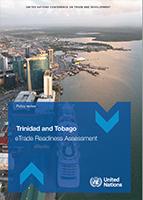
The eTrade Readiness Assessment of Trinidad and Tobago is the thirty-seventh assessment conducted by UNCTAD. It is the second assessment in Latin America and Caribbean, following the Peru eTrade Readiness Assessment in 2023. It provides an in-depth review of the e-commerce ecosystem, as well as recommendations that seek to enable Trinidad and Tobago to move forward, at both national and regional levels, in leveraging e-commerce for development.
The main findings are presented below by policy area:
- The Government of the Republic of Trinidad and Tobago (GoRTT) has prioritized e-commerce development since the early 2000s, with several key digital transformation initiatives. The Ministry of Trade and Industry launched a National E-commerce Strategy in 2017, while the Ministry of Digital Transformation developed the National Digital Transformation Strategy 2024-2027. Some key government initiatives involved the development of platforms including a single electronic window (TTBizLink), a government online payment gateway (GovPayTT), and a platform which provides local developers with tools, resources and support (Developers’ Hub). However, challenges persist in enhancing coordination among government agencies and other stakeholders and improving data availability for e-commerce.
- Trinidad and Tobago has a robust information and communications technology (ICT) infrastructure, bolstered by both government and private sector investments. The country boasts one of the highest mobile phone penetrations globally and is a leader within spectrum management in the region. Despite this, a digital divide remains for underserved communities, and efforts are needed to make services more accessible, reduce costs, and improve the availability of data.
- Effective e-commerce relies on robust trade facilitation and logistics, and Trinidad and Tobago was a pioneer in the region with the first Single Electronic Window, TTBizLink, which offers 48 online services for businesses. It also has varied transport infrastructure, and national postal services that plan to initiate a reform process. However, customs procedures do not leverage ICT fully and there is reported scope for more coordination among public sector agencies responsible for trade facilitation, as well as for improved interoperability of platforms.
- Trinidad and Tobago has a well-developed financial and banking system and numerous initiatives involving digital payments and services. However, cash still dominates the payment landscape, and access to banking services remains a challenge for micro, small, and medium-sized enterprises (MSMEs) and individuals. Additionally, non-bank institutions like credit unions and e-money issuers still face barriers to accessing certain payment infrastructures, limiting the country's full potential in digital payments.
- Several laws regulate e-commerce in Trinidad and Tobago, including the 2011 Electronic Transactions Act and the Data Protection Act among others. Trinidad and Tobago has also started the process of acceding to the Budapest Convention on Cybercrime of the Council of Europe. Nevertheless, the current legislative frameworks such as cybersecurity, data protection and consumer protection can be improved, and awareness of applicable laws and frameworks can be promoted.
- Trinidad and Tobago has a highly literate population, with significant potential for developing digital and e-commerce skills. While basic ICT skills are widespread, gaps in intermediate and advanced digital skills remain. There are also gender disparities, with women less confident in their digital abilities and underrepresented in technical fields. Targeted interventions at all levels of education and in the workplace are needed to bridge these gaps and build a more digitally skilled workforce to support the country’s e-commerce sector.
- MSMEs can be a driving force for e-commerce and the digital economy, as they constitute the majority of domestic businesses and contribute significantly to economic growth and job creation. Despite progress in the array of financial products provided by the banking sector and in the national start-up and entrepreneurial ecosystem, bottlenecks faced by MSMEs in terms of requirements to open a business bank account, capacity-building, training, and access to finance remain.
The policy recommendations outlined in Trinidad and Tobago’s eT Ready report aim to contribute to further strengthen the efforts that the Government initiated since the early 2000s in pursuit of the digital transformation of the economy and society, including the development of its National E-Commerce Strategy 2025-2030.
This assessment was made possible through the financial support of the Government of the Republic of Trinidad and Tobago and the E-commerce and Digital Economy Programme Core Donors (Germany, Switzerland, Sweden, and the Netherlands).


